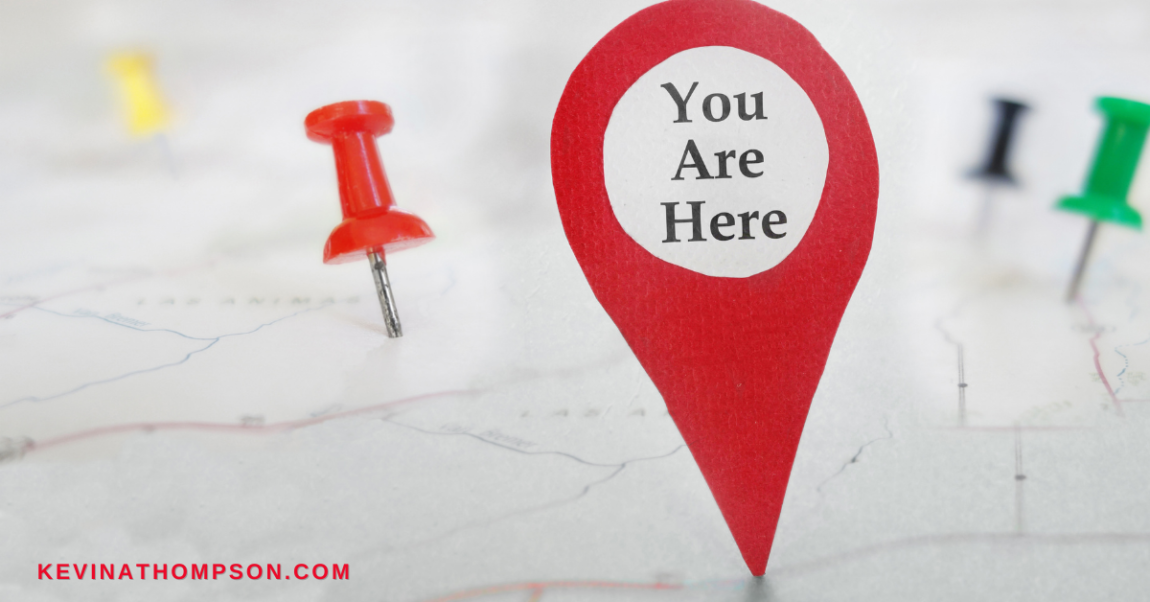Whenever I travel with Jenny, we go through a routine dance. We deplane at DFW with time to spare before our connecting flight. We need to eat, yet Jenny and I always have opposing plans. I want to get to our next gate as quickly as possible and then find something nearby to eat. She always wants to find the best restaurant she can and then find the gate later. If the kids are with us, we split up and plan on meeting at the gate near the time of our departure, but when it’s just the two of us, I normally follow her lead.
No matter where we want to go, the first step is always the same–we have to determine where we are. What terminal are we in? What gate are we at? Where are we?
In airports, there are always maps and on every map is a key dot that reads, “You are here.” It seems silly, but it probably is the most important identifier on the map. Unless you know where you are on a map, all other information is useless. (See: Change–How to Handle an Unexpected Turn in Life)
Wherever you want to go, getting there starts by knowing where you are. When you identify your destination and recognize your location, you can navigate between the two. You may not know every step, but you can confidently begin to take the first steps. However, when you are ignorant of where you are, it doesn’t matter how well you know where you want to go, because you will have no idea how to get there.
It’s true in airports and it’s true in life.
The difficulty is that an airport conveniently puts a sticker on the map to say “you are here.” Life isn’t always so helpful. Many of us live in denial of our actual location. Rather than recognizing our true state, we assume we are better than we are or that our poor choices aren’t having a negative impact on us or those around us.
Obvious To Others
This is easy to see in others, but not so simple to identify in ourselves.
Consider the addict. To everyone around him, it’s obvious how his choices are destroying his life and the lives of others. Yet, so often, the addict will live in denial, pretending like nothing is wrong.
I see it in couples. I can see their relationship struggling. One or even both spouses will privately confide that things are not where they want it to be. But when I recommend counseling, they refuse. They might admit they need it, but they refuse to make the appointment, attend the sessions, do the work, and see what kind of relationship they can have on the other side.
Instead, they choose denial. And so do we. Rather than admitting where we are, we pretend as though we are in a better spot, our choices aren’t hurting others, and that life is generally okay. That denial comes with a price.
The Price of Denial
The great sign that we are in denial of our location is being stuck. When we know where we are and where we want to go, it’s easy to take the next step. We see the gap between the two and start moving toward where we desire to be or who we desire to become. Yet when we are in denial about where we are, we don’t know how to get to where we want to go. (See: You Won’t Change Until…)
We know we need to move, but we don’t know what step to take. So we take a step and then step back. We try another direction and then come back. We do a lot of movement, but we don’t actually move anywhere. The result is seasons, months, years, and even decades of staying in the same place. Despite a great deal of effort, we haven’t grown. In spite of great worry and concern, we haven’t improved.
If you are stuck, chances are you are in denial of some aspect of where you actually are.
How to Move Forward
The way forward is simple–brutal honesty. So often when we hear those words we think of a friend who has the ability to say whatever they want whenever they want. We think, “how great would it be to say whatever we want without caring about others?” But that’s not what we need. We don’t need to be brutally honest about others; we need to be brutally honest about ourselves, with ourselves, with God, and with others.
We can’t get where we’re going until we admit where we are. Marriages won’t improve until we admit there is room for improvement. Addictions won’t be overcome until we confess we are powerless over our lives. Growth won’t take place until we enlist a mentor or coach to assist us. (See: Why a New Job (or Spouse) Rarely Leads to a Changed Life)
It all begins when we locate where we are and admit where we are. If your life was a map, where would the “You Are Here” sign be located? That’s where you are. Recognize it. Admit it. Tell it to someone else. As soon as you do, life can change.



